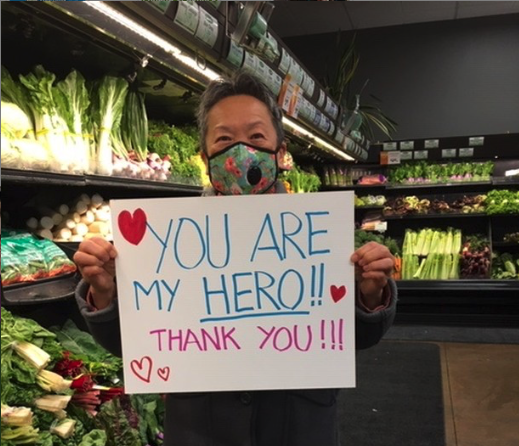
Food cooperatives are deemed as “essential businesses” by local and federal governments and thus are doing everything in their power to ensure a safe and healthy environment for shoppers to get what they need. These frontline workers are considered a highly vulnerable population as they interact with hundreds of people coming in and out of their stores each day.
“The individuals who stock our shelves and bins, manage the check-outs, assist you in the aisles, clean the stores—all are on the frontlines, supporting our nation through this crisis,” said C.E. Pugh, CEO of National Co+op Grocers, the business services cooperative for 147 retail food co-ops operating in 200 storefronts in 38 states nationwide. “As they face unprecedented demand, they are rising to the occasion of service in inspiring ways—and they are doing this even as they adjust to the rapidly changing dynamics of their own families and lives.”
Across many of these food co-ops, trends are popping up of the precautionary measures being taken to both benefit staff and keep communities safe:
- Adjusted hours to allow staff to fully sanitize and stock stores.

Plexiglass shields installed to increase safety at checkouts. [Photo: Middlebury Food Co-op] - (Middlebury Natural Foods Co-op, People’s Food Co-op, First Alternative Natural Foods Co-op, Sugar Beet Food Co-op, Davis Food Co-op, Franklin Community Co-op, Monadnock Co-op, Alberta Food Co-op, Mississippi Market Co-op, Dill Pickle Food Co-op, Pachamama Coffee, Greentree Cooperative Grocery, Wheatsville Food Co-op)
- Special hours for “at-risk” and senior citizen populations to shop when the stores are freshly sanitized and without crowds.
- (Ashland Food Co-op, Whole Foods Co-op (Erie, PA), Davis Food Co-op, Franklin Co-op, Monadnock Co-op, Mississippi Market Co-op, Dill Pickle Food Co-op, Wheatsville Food Co-op)
- Bonuses and community funds started to compensate employees and acknowledge their essential service and commitment.
- (Ashland Food Co-op, Sugar Beet Food Co-op, Mississippi Market Co-op)
- Plexiglass shields installed at checkouts to separate the customer and cashier.
- (Middlebury Natural Foods Co-op, Davis Food Co-op, Mississippi Market Co-op, Wheatsville Food Co-op)
- Only allowing 10-15 shoppers in the store at a time to comply with social distancing guidelines.
- (People’s Food Co-op, Alberta Food Co-op)
- Adding tape 6 feet apart for customers waiting on lines to get into the store or at the cash register.
- (Ashland Food Co-op, First Alternative Co-op, Davis Food Co-op, Franklin Co-op, Mississippi Market Co-op)
- Asking shoppers and staff to wear gloves and masks in the co-op and to wash hands before entering.
- (Middlebury co-op, Davis Food Co-op)
- Offering curbside pickup and online ordering.
- (Ashland Food Co-op, Whole Foods Co-op (Erie, PA), Sugar Beet Food Co-op, Tidal Creek Food Co-op, Franklin Co-op, Dill Pickle Food Co-op)
- Offering virtual cooking classes and community events.
- (Mississippi Market Co-op)
*In the coming weeks, NCBA CLUSA is highlighting the way cooperatives are demonstrating community commitment during this tough time. Email us at info@ncba.coop to share how co-ops are helping your community.*


